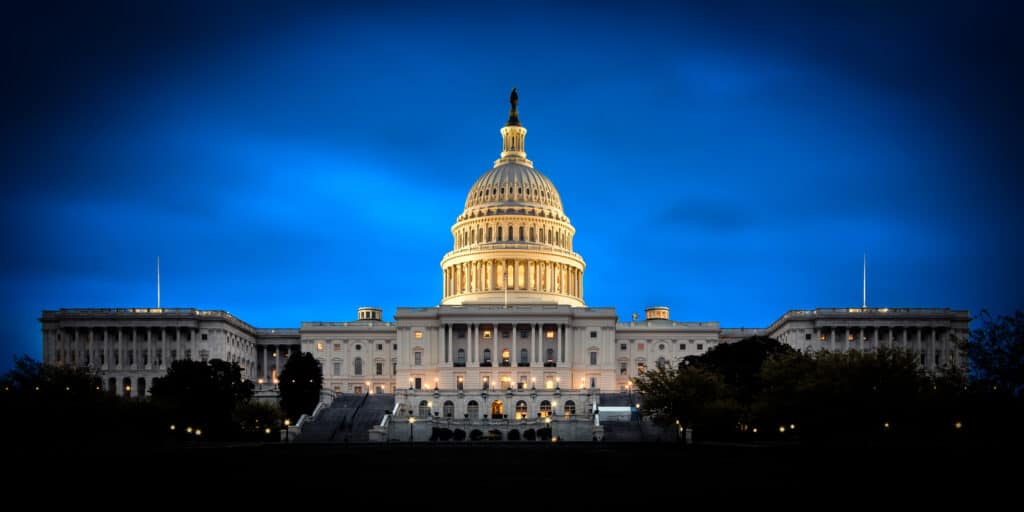
Democrats defied expectations in the 2022 midterm elections, holding off a red wave by squeaking out victories in crucial races for U.S. House and Senate seats. Still, Republicans are in position to retake the House, and could still eke out a net gain of one Senate seat. Either scenario would ensure a divided government for the rest of President Joe Biden’s term.
To break down the election results and the state of American politics, we spoke with three USC experts: William Resh, C.C. Crawford Professor in Management and Performance at the USC Sol Price School of Public Policy; Ange-Marie Hancock, chair of Political Science and International Relations at USC Dornsife; and Christian Grose, academic director of the USC Price School-affiliated USC Schwarzenegger Institute for State and Global Policy.
What did the midterm elections tell us about the state of American politics?

Resh: The bad news is actually pretty constant: We still lack a new Voting Rights Act. Gerrymandering is still in place in many states. Poll workers are still being threatened. And we have one-party rule in many states across the union. So those constants remain. The good news, though, is that many of the candidates who were quoted as denying Biden’s rightful election were trounced.
Hancock: It’s pretty clear that we have made a shift to where we will not know results on election night, so I think that is a cultural shift that all American voters are going to have to get used to whether you’re Republican or Democrat. We’re not going back to the days where we would know every single result on Election Night.
Grose: Things are fairly evenly divided between Republicans and Democrats. I do think Trump is not in as strong of a position for his potential run for president, given that a lot of the more Trumpian-style candidates or endorsed candidates didn’t perform. Some of them did, but not as well as you might have expected.
Why did we not see the Republican “red wave” that many political observers expected?
Resh: The Supreme Court’s decision, reversing Roe v. Wade through the Dobbs decision, was a big impetus towards preventing any type of red wave. I also think that inflation is a fickle thing for a party to run on because you can look around the world and see inflation affecting every other country as well. Many voters are smart enough to understand that these are general economic trends that are hardly preventable by any given president or any given party.
Hancock: The key independents and moderate voters that Republicans needed to win back – that Biden had won in 2020 – did not come back to the Republican Party. College educated whites and women voters – even though they were concerned about inflation, even though they were concerned about some of the key issues that Republicans really tried to push – they did not go back in the Republican way. Instead, they chose to stick with the Democrats.

Grose: One reason goes back to the redistricting, and it goes all the way back to 2010. In 2010, Republicans did a very extensive job of redistricting a lot of maps in their favor to the point that there weren’t a lot of places to grow in 2022, when it comes to remapping again. So the Republicans kind of already had a fairly maxed-out set of gerrymandered maps. And then you add on top of that changes to redistricting processes in a bunch of states, and where courts decided to make the maps more competitive.
What do the results say about the Republican Party and former President Trump’s influence?
Resh: It’s indicative of this dissolution of the traditional Republican coalition. We’re seeing new coalitions formed in American politics that have really marginalized, in many respects, some of those conservatives who are more liberal-leaning on social issues but conservative on economic issues. We’ve also seen a shift from large businesses and large-business interests away from the Republican coalition, as traditionally it was held. So I think the relative losses that the MAGA Republicans endured is reflective of the fact that they’re unwilling to negotiate, unwilling to come to some agreement with anyone that doesn’t fit their exact ideological profile.
Hancock: The idea of election denialism is one that did not succeed in Georgia and did not succeed in several other places, like Pennsylvania in the governor’s race. I do think that there was a bit of a repudiation. Some races still haven’t been called, so we can’t say it was a definitive repudiation of election denialism. But I do think that even though people might agree with Republicans on the issues, when you have candidates who refuse to accept the results of a legitimate and fair election, that is a bridge too far to cross for many independent and moderate voters.
Grose: Trump has some baggage for Republicans, especially among independent voters and voters who maybe lean Republican that aren’t that enthusiastic about Trump. On the other hand, Trump brings out a certain set of voters that don’t actually participate in other elections. So while Trump turns off some Republican voters, I think he actually mobilizes some Republican voters who generally have sat out elections for a long time. Trump is unpredictable in terms of how he mobilizes voters.

How could the midterm results affect the balance of power in Washington?
Resh: I think, generally speaking, it’s going to be a little bit of a status quo on some dimensions of the balance of power. On other issues, you’re going to see an end to the January 6th committee. You’ll see committees focused on the exit from Afghanistan; focused on Hunter Biden, and so on and so forth. But Republicans’ ability to be able to see through any of their policy preferences on the House side is going to be nil, essentially. They’ll have the ability to bring some things to salience or importance to the general policy agenda, but they just don’t have the numbers to be able to pass this stuff.
Hancock: It is likely that the House will still go to the Republicans, but at that small margin it will be very difficult for them to successfully govern. If, in fact, Kevin McCarthy of Bakersfield becomes the Speaker of the House, he has a very polarized caucus that he has to pull together with a smaller margin to be able to get things passed. It gives an outsized role to some of the very elements of the Republican caucus I think independent and moderate voters are turned off by.
Grose: Whoever the Speaker of the House would be, if it’s McCarthy or another Republican, it would be really challenging to govern people who are as moderate as the types of people who are able to get elected in competitive Orange County, California, districts and then conservative Republicans elected in places like Kentucky and Texas and Tennessee. That governing coalition is going to be really, really challenging.